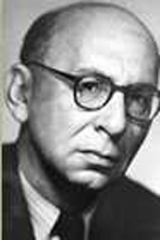
Antoni Slonimski
Encyclopedia
Antoni Słonimski was a Polish
poet
, journalist, playwright
and prose
writer
, president of the Union of Polish Writers in 1956–1959 during the Polish October
, known for his devotion to social justice.
Słonimski was born into a Jewish family in Warsaw
. He was baptized and raised as a Catholic
. Słonimski studied at the Academy of Fine Arts in Warsaw
. In 1919 he co-founded the Skamander
group of experimental poets with Julian Tuwim
and Jarosław Iwaszkiewicz. In 1924 he travelled to Palestine and Brasil and in 1932 to the Soviet Union.
Słonimski spent the war years
in exile in England and France, returning to Poland in 1951. He worked as contributor to popular periodicals: Nowa Kultura (1950–1962), Szpilki (1953–73) and Przegląd Kulturalny. He was an active anti-Stalinist and supporter of liberalization. Słonimski died on 4 July 1976 in a car accident in Warsaw.
Poland
Poland , officially the Republic of Poland , is a country in Central Europe bordered by Germany to the west; the Czech Republic and Slovakia to the south; Ukraine, Belarus and Lithuania to the east; and the Baltic Sea and Kaliningrad Oblast, a Russian exclave, to the north...
poet
Poet
A poet is a person who writes poetry. A poet's work can be literal, meaning that his work is derived from a specific event, or metaphorical, meaning that his work can take on many meanings and forms. Poets have existed since antiquity, in nearly all languages, and have produced works that vary...
, journalist, playwright
Playwright
A playwright, also called a dramatist, is a person who writes plays.The term is not a variant spelling of "playwrite", but something quite distinct: the word wright is an archaic English term for a craftsman or builder...
and prose
Prose
Prose is the most typical form of written language, applying ordinary grammatical structure and natural flow of speech rather than rhythmic structure...
writer
Writer
A writer is a person who produces literature, such as novels, short stories, plays, screenplays, poetry, or other literary art. Skilled writers are able to use language to portray ideas and images....
, president of the Union of Polish Writers in 1956–1959 during the Polish October
Polish October
Polish October, also known as October 1956, Polish thaw, or Gomułka's thaw, marked a change in the Polish internal political scene in the second half of 1956...
, known for his devotion to social justice.
Słonimski was born into a Jewish family in Warsaw
Warsaw
Warsaw is the capital and largest city of Poland. It is located on the Vistula River, roughly from the Baltic Sea and from the Carpathian Mountains. Its population in 2010 was estimated at 1,716,855 residents with a greater metropolitan area of 2,631,902 residents, making Warsaw the 10th most...
. He was baptized and raised as a Catholic
Catholic
The word catholic comes from the Greek phrase , meaning "on the whole," "according to the whole" or "in general", and is a combination of the Greek words meaning "about" and meaning "whole"...
. Słonimski studied at the Academy of Fine Arts in Warsaw
Academy of Fine Arts in Warsaw
Academy of Fine Arts in Warsaw is a public university of visual and applied arts located in the Polish capital. The Academy traces its history back to the Department of Arts founded at the Warsaw University in 1812. As a separate institution it was founded in 1844 during the Partitions of Poland...
. In 1919 he co-founded the Skamander
Skamander
Skamander was a Polish group of experimental poets founded in 1918 by Julian Tuwim, Antoni Słonimski, Jarosław Iwaszkiewicz, Kazimierz Wierzyński and Jan Lechoń....
group of experimental poets with Julian Tuwim
Julian Tuwim
Julian Tuwim , sometimes used pseudonym "Oldlen" when writing song lyrics. He was a Polish poet, born in Łódź, Congress Poland, Russian Empire, of Jewish parents, and educated in Łódź and Warsaw where he studied law and philosophy at Warsaw University...
and Jarosław Iwaszkiewicz. In 1924 he travelled to Palestine and Brasil and in 1932 to the Soviet Union.
Słonimski spent the war years
World War II
World War II, or the Second World War , was a global conflict lasting from 1939 to 1945, involving most of the world's nations—including all of the great powers—eventually forming two opposing military alliances: the Allies and the Axis...
in exile in England and France, returning to Poland in 1951. He worked as contributor to popular periodicals: Nowa Kultura (1950–1962), Szpilki (1953–73) and Przegląd Kulturalny. He was an active anti-Stalinist and supporter of liberalization. Słonimski died on 4 July 1976 in a car accident in Warsaw.
Works
- Sonety (1918)
- Parada (1920)
- Godzina poezji (1923)
- Droga na wschód (Road to the East; 1924), a collection of poems inspired by his travels to Palestine and Brazil
- Z dalekiej podróży (1926)
- Rodzina (Family; 1933), a comedy about two brothers: a communist, and a fascist
- Okno bez krat (1935)
- Dwa końce świata (Two Ends of the World; 1937), a novel predicting Warsaw's destruction by a Nazi dictator
- Alarm (1940)
- Wiek klęski (1945)
- Nowe wiersze (1959)
- Wiersze 1958-1963 (1963)
- 138 wierszy (1973)
Sources
See also
- Polish literaturePolish literaturePolish literature is the literary tradition of Poland. Most Polish literature has been written in the Polish language, though other languages, used in Poland over the centuries, have also contributed to Polish literary traditions, including Yiddish, Lithuanian, Ukrainian, Belarusian, German and...

